‘We need to put Trump behind us’ – what a Biden presidency will mean for Iranians
There is flickering hope that, with the departure of Trump from the White House, life in Iran will improve, but political struggles in Tehran are tempering expectations

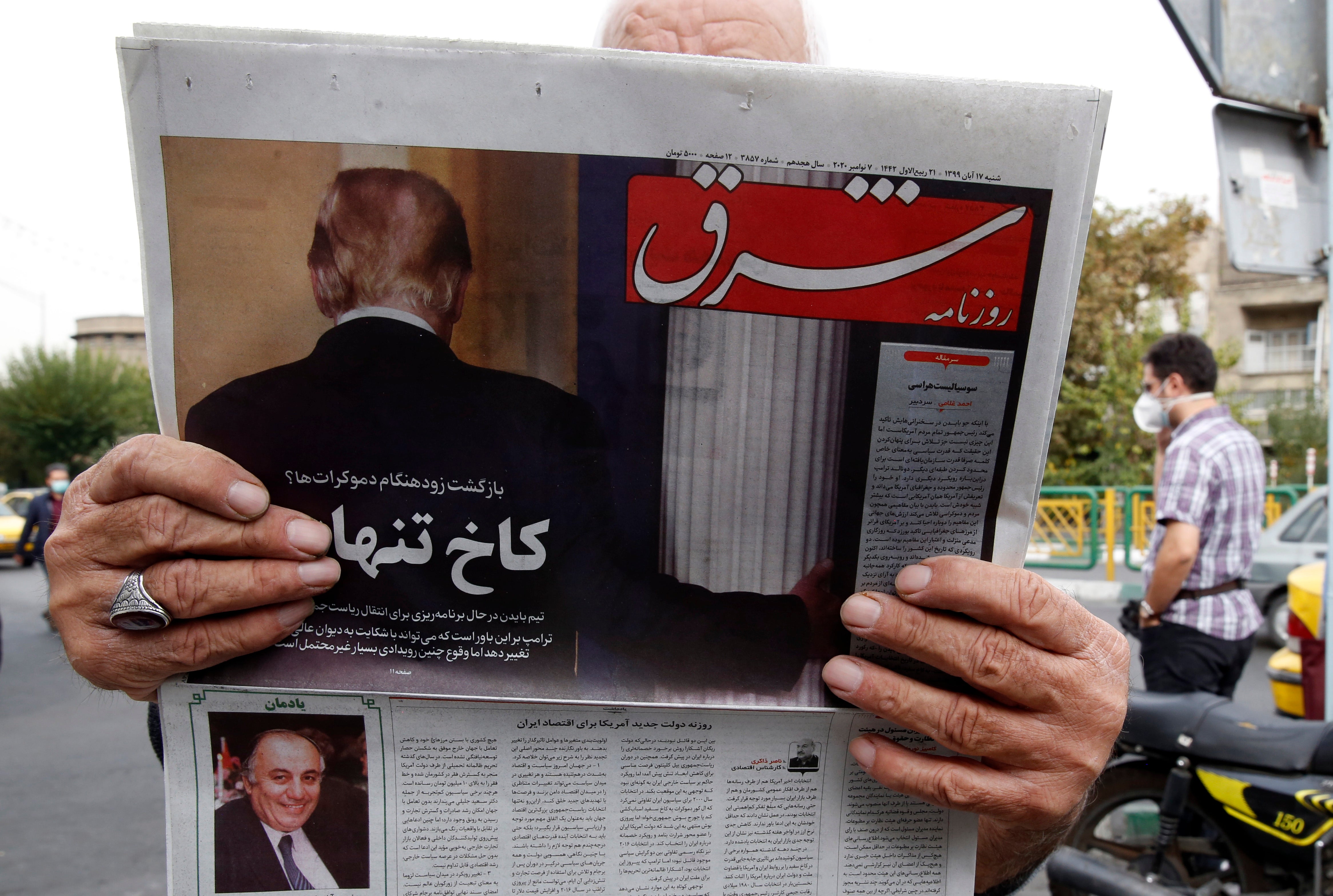
Your support helps us to tell the story
From reproductive rights to climate change to Big Tech, The Independent is on the ground when the story is developing. Whether it's investigating the financials of Elon Musk's pro-Trump PAC or producing our latest documentary, 'The A Word', which shines a light on the American women fighting for reproductive rights, we know how important it is to parse out the facts from the messaging.
At such a critical moment in US history, we need reporters on the ground. Your donation allows us to keep sending journalists to speak to both sides of the story.
The Independent is trusted by Americans across the entire political spectrum. And unlike many other quality news outlets, we choose not to lock Americans out of our reporting and analysis with paywalls. We believe quality journalism should be available to everyone, paid for by those who can afford it.
Your support makes all the difference.The next few months are a time of great trepidation for the people of Iran, as they wait to see whether Donald Trump will lash out one last time, carrying out military strikes on their country before he is forced out of the White House.
Reports that Trump had asked his advisers last week for targets to strike in Iran seemed to confirm the apprehension that he had sacked his defence secretary, Mark Esper, and carried out a cull of senior officials at the Pentagon in order to prepare for a conflict abroad.
The outgoing president was dissuaded from an attack by Mike Pompeo, Mike Pence and the chairman of the joint chiefs, General Mark Milley. Even Christopher Miller, brought in as Esper’s hawkish replacement, argued against it. But Trump is understood to still be seeking to punish Iran for “hiding” its nuclear programme, and the military option is said to remain on the table.
Iran gave the expected response of dire consequences if the US carried out an attack. “Any action against the Iranian nation would certainly face a crushing response,” said government spokesperson Ali Raber. Precautionary defensive measures were being taken across the country, according to local media.
The possibility that Trump may do something in the twilight of his presidency is not a matter of surprise for Iranians. “After all,” said Homa Soroush, in Tehran, “he has been a presence in our lives for the last few years. Now every day that goes by before he leaves, without something happening, is a relief.
“Look at the state of our country, look at what’s happened to the economy, our politics,” Homa continued. “It’s not all his doings, of course, we have a big coronavirus problem on top of everything else, but he has played a big part in ruining our hopes, all we were looking forward to.”
I had met Homa four years ago in Tehran at a shopping centre in Fereshteh Street, which was gearing up for the coming of luxury labels, following the signing of the nuclear deal and a winding down of sanctions. Gianfranco Ferré, Donna Karan and Pierre Cardin would soon be there, according to posters. One fashion house, Roberto Cavalli, had opened a store in nearby Zafaraniyeh district.
Dolce & Gabbana, meanwhile, had just launched a new hijab range for the Middle East, unveiling a “neutral colour palette of luxe black and sandy beige”, with one eye on the market in Iran and one on the region’s most populous nations.
Homa rather doubted that the range would be much of a seller if it came to Iran. “Maybe it would do well in the Gulf States, but here? I don’t think so, clothing is much freer here,” said the 34-year-old businesswoman, her hair just covered by a pink scarf. “The expensive stuff isn’t available to most people, of course. The real gains from the sanctions going would be the opening up to the outside world – that’s going to benefit everyone. People will be able to travel, people from other countries will come here.”
The reformers won a sweeping victory at the parliamentary elections I was covering at the time, with huge expectations raised by the prospect of the country opening up. This was especially the case among the young, including 23-year-old Navid Karimi, who aimed to get a well-paid job with his engineering degree, go on a road trip to the US and avoid dying fighting in Syria. All of these things, he felt, would now be possible.
That changed with Trump’s election. The new US president went on a full offensive, as he had promised to do, to dismantle the nuclear deal. Punitive sanctions were imposed, the Iranian economy shattered. The IT business Homa ran with her husband Hashem were typical of the ones which suffered – they had to lay off half their staff.
In the background, with the assassination of General Qasem Soleimani, the commander of the Islamic Revolutionary Guards Corps (IRGC), by the US, and then the shooting down of a Ukrainian airliner by the Iranians, there was real fear of war.
Now, with the victory of Joe Biden, there is flickering hope that things will improve. The Americans may rejoin the Joint Comprehensive Plan of Action (JCPOA), the sanctions may be eased, and a sense of normality may return to a society effectively under siege.
Iran is the most immediate challenge facing the Biden administration and the one the president-elect says he wants to resolve. The nuclear deal, concluded through painstaking effort, was a Democrat achievement under Barack Obama, with Secretary of State John Kerry playing an instrumental part. Biden has promised a “credible path back to diplomacy”, saying he wants to return to the JCPOA as a “starting point for follow-on negotiations”.
Iran’s foreign minister Mohammad Javad Zarif, who was also a key figure in the agreement being signed, tweeted: “The world is watching whether the new leaders will abandon disastrous lawless bullying of the outgoing regime – and accept multilateralism, cooperation and respect for law.”
It is not, however, going to be a totally straightforward process and Iranians have learned to temper their aspirations with all the twists and turns they have experienced in the recent past.
Hassan Rouhani, who had signed the JCPOA against the fierce opposition of the country’s hardliners, stood for re-election three years ago. His popularity seemed high, but there was foreboding about what the Trump administration would do, with the US president repeatedly decrying the agreement.
“How can what Trump says be anything but damaging?” asked Siavash Sharivar, a civic society organiser who had been helping the Rouhani campaign. “There are unfortunately people who will use it against the agreement and whip up feelings against foreigners. Our fear is that we will start going backwards.”
Sharivar was speaking at a rally at the Shobada Centre in Tehran’s Imam Khomeini Square. Around three-quarters of those present were young, and half of these were women. An orchestra with violins and cellos, along with Iranian string instruments like the setar and tanburs, played traditional and modern music. The crowd chanted, “We are building a new Iran”. But as it broke up, a number of them echoed deep concern about what may happen.
Rouhani had come under ferocious attack from the hardliners during the campaign. His opponent, Ebrahim Raisi, hammered the message time and again that the JCPOA had weakened national security, that the US and its allies could not be trusted.
Rouhani still won. But the situation had changed drastically when I returned to cover the parliamentary election nine months ago. Only relatively small crowds turned out to vote this time; the mood was subdued and sombre. Many of those who had queued up so eagerly to back the liberals in the past did not vote this time. Their dismay was not just about the failure of the nuclear deal to deliver what was expected, but also corruption and inefficiency among politicians and public officials.
The turnout was the lowest since the 1979 revolution, hovering at just 42 per cent, compared to 62 per cent in the previous election. The figure fell to 25 per cent in the cities, where the electorate had previously helped to put the reformists in power. The result of the election was a crushing victory for the hardliners. They took every seat in Tehran and won a significant majority across the country.
This is one of the major potential problems in resuscitating the nuclear deal. Iran’s presidential elections are scheduled for June next year. And it would be politically advantageous to the hardliners, now in control of parliament, if the nuclear deal is not revived before then.
Nasser Hadian Jazy, a professor of political science and international relations at Tehran University, describes the scenario the conservatives would prefer. “They think if the current condition continued, the rate of participation in the political process in Iran would be low. And if the participation is low, they have a better chance of winning the election,” he said at an online discussion organised by the Royal United Services Institute (RUSI) in London.
Having served for two terms, Rouhani is ineligible to stand next time and the reformists have to choose someone to replace him. Other possible candidates to stand in the election include the populist former president, Mahmoud Ahmadinejad, and Mohammad Bagher Qalibaf, a former mayor of Tehran and former police chief, the new parliamentary speaker.
The level of disillusionment with the political process is such, some hold, that the reformists have lost their vote-bank. The prominent analyst Sadegh Zibakalam predicted the turnout would be as low as 30 per cent, with the fall sharpest among the young, the educated, and in the cities. “People have turned their backs on the ballot box,” he said. “That is what we are seeing.”
I had met Rustam and Farah Shirazi when they turned up to vote in affluent, liberal north Tehran at the last election and then decided, at the end, not to cast their vote. What will they do next time? “We have discussed this amongst ourselves and our friends,” said Rustam, an architect. “We still feel it was right to reject [voting] but now we have to look at other factors. We do not want someone like Ahmadinejad to get in if he stands. There are bad memories of what happened when he was president.
“We did not think in international terms during our election. Trump going is better for the world, and so it is better for Iran. It will be good all around if the new American president gets back to the agreement and there is a government in Iran who will work on this.”
Some of Biden’s advisors are said to hold that so much has changed in the last few years that one cannot just rejoin the nuclear deal without addressing the issues of Iran’s missile programme and its role in the region’s conflicts.
The JCPOA, however, was signed to deal with the nuclear programme, with other issues kept separate and Iran insists that it will be sticking to this. “This nuclear agreement is done and sealed off. Iran has repeatedly said that the nuclear accord belongs to the past and cannot reopen for new considerations,” said Saeed Khatibzadeh, the foreign ministry spokesman.
Khatibzadeh also raised a demand now being made by the Iranian government, that the US should pay compensation for the economic harm inflicted by the sanctions.
There is little chance of the Biden administration agreeing to this and that is understood by some in Tehran. “That would be almost impossible to do for the US. I think the Europeans, particularly president Macron, and people like the Japanese can provide some form of compensation in forms of loans, and investment promises,” said Jazy.
For some Iranians, these are details which can be settled in the future, and the imperative must be to reach an agreement and look once again to the gains that will bring.
“There has been a lot of struggle with coronavirus, the economy,” said Homa Soroush. “We just want to get over all this, get jobs for our young people, that is what people want. We are more realistic than last time about what we’ll get with an agreement. But we need to get some hope and we need to put Trump behind us.”
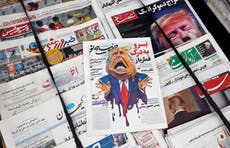
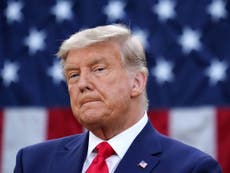
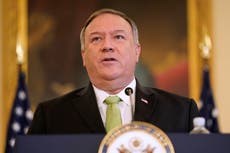
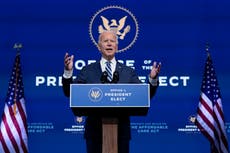
Join our commenting forum
Join thought-provoking conversations, follow other Independent readers and see their replies
Comments